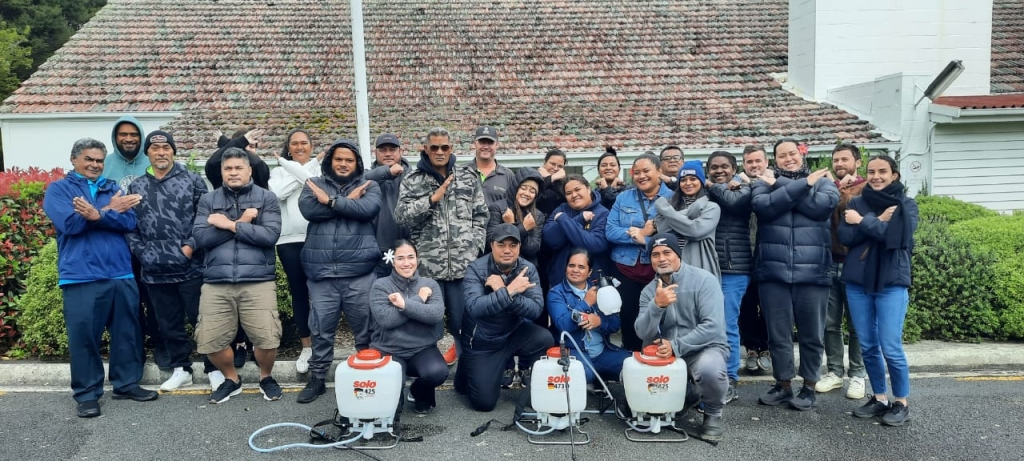
Pacific Invasive Species Battlers Certified in Agrichemical Risk Management
Auckland, New Zealand, 18 September 2024: Invasive species management practitioners who are currently attending the Pacific Regional Invasive Species Management Support Service (PRISMSS) coordinated regional study tour in Auckland are now better equipped to manage risks associated with agrichemical use, which is crucial for controlling invasive species.
Agrichemicals are products used in an agricultural context. They include products used for plant protection in agriculture, horticulture, forestry, conservation, amenity, and infrastructure use. They also include veterinary medicines and animal health products, and detergents and sanitisers used in an agricultural context. For conservation purposes they are mostly used for managing invasive plants.
The certification attained by the Pacific invasive species battlers will be invaluable for weed management spray applicators involved in the PRISMSS War on Weeds (WOW) and the Resilient Ecosystems-Resilient Communities (RERC) programme initiatives.
Hazardous substances are commonly used at most work sites, necessitating Emergency Management Procedures that include spill kits and personal protective clothing, such as respirators. These procedures are a vital part of emergency management.
Controlling invasive plants is essential for the well-being of the Pacific islands and territories. Applicators must be aware of the risks to humans, the environment, and other plant species when using agrichemicals. This comprehensive approach ensures a proactive and coordinated effort to manage invasive species across ecosystems.
The Secretariat of the Pacific Regional Environment Programme (SPREP) Invasive Species Adviser, Mr. David Moverley commented, “it is very important to understand what options are available for managing invasive plants and the risks they pose both to people and the environment.”
“This training helps Pacific Battlers to understand this and choose the appropriate products to use for their situation. We always promote the lowest toxicity herbicide available that is effective on the target species. This means that the protective equipment required to keep people safe is minimal and the risks to the environment are largely negated.”
The interactive training, which included both theoretical and practical sessions on agrichemical risk management, was provided by Educhem Ltd, one of New Zealand’s leading hazardous substance training providers, who train and certify to meet the requirements of New Zealand Standard NZS8409:2021.
‘There are several aspects to managing the risks associated with agrichemical application, including understanding the risks when handling and storing chemicals, the correct use of personal protective equipment (PPE), spill containment, correct nozzle selection, and the maintenance of spray equipment,’ said Mr. Grant Beare, training provider and CEO of Educhem.

Participants of the regional study tour learned the importance of properly identifying and understanding labels on commonly used weed management agrichemicals in the Pacific and their Safety Data Sheets, which is where the risks to humans and the environment of each substance may be found.
The correct use of PPE when handling hazardous substances like agrichemicals was re-emphasised. Examples of appropriate chemical-resistant spray suits, aprons, gloves, face shields, safety glasses, and respiratory protection equipment were shown to the participants to help them understand the importance of using the right type of PPE when handling specific agrichemicals.
The Pacific invasive species battlers also received hands on training on spill containment, correct nozzle selection for agrichemical spray application and the proper maintenance of spray equipment to avoid environmental and human harm.
The study tour brings together invasive species management professionals and practitioners from across the Pacific region to share and learn from their successes, identify possible sustainable solutions to challenges, expand their knowledge and establish meaningful connections.
The regional study tour is made possible with funding support from the Global Environment Facility funded GEF 6 Regional Invasives Project, the European Union funded PROTEGE project, the New Zealand Government funded Managing Invasive Species for Climate Change Adaptation in the Pacific (MISCCAP) project and supported by the Secretariat of the SPREP through PRISMSS.
About PRISMSS: The Pacific Regional Invasive Species Management Support Service (PRISMSS) is a coordinating mechanism designed to facilitate the scaling up of operational management of invasive species in the Pacific. PRISMSS brings together experts to provide support within the Pacific region with a focus on protection of indigenous biodiversity and ecosystem function. As a service provider, PRISMSS provides a comprehensive suite of support services in a cohesive, effective, efficient, and accessible manner to Pacific Island countries and territories.
For further information please contact Mr Nitish Narayan, PRISMSS Communications & Liaison Officer on [email protected]
Distribution channels: Environment
Legal Disclaimer:
EIN Presswire provides this news content "as is" without warranty of any kind. We do not accept any responsibility or liability for the accuracy, content, images, videos, licenses, completeness, legality, or reliability of the information contained in this article. If you have any complaints or copyright issues related to this article, kindly contact the author above.
Submit your press release